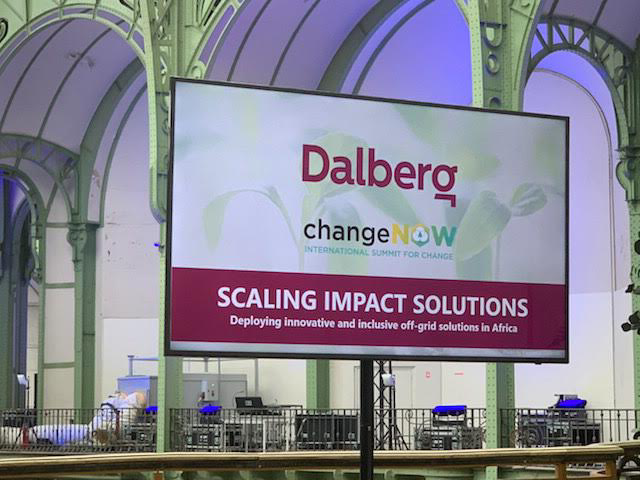A few weeks ago I stood alongside Yusuf Oladipupo Bilesanmi, a social entrepreneur from Nigeria who developed Ejaice, an affordable solar-powered refrigerator for women fish traders. We were at the Grand Palais during the Change Now Summit in Paris and had a chance to pitch to Frédéric Pfister, an investor from NEoTCapital. For me, the pitch event organized by Dalberg, a management consulting company who are helping to strengthen and build an ecosystem of social enterprise in emerging markets, was an opportunity to reflect on a journey that started in earnest more than two years ago.
Trading the security of a monthly salary after almost twenty years working in the international development sector to become a social entrepreneur in Africa has been quite a ride. When I set out to bring the electric vehicle revolution to rural women – the people I believe who need it the most - I was confident that such a brilliant idea would immediately lead to investment and action.
Having travelled through many parts of the African continent, I had witnessed how critical mobility is to development. I met mothers who had barely made it to a health clinic alive to deliver their baby safely; I talked with too many children who had dropped out of school due to their long daily commute; and I passed field after field of crops rotting before they could get to local markets.
Driven by the same idealism to create a fairer world that led me into the United Nations more than two decades ago, Mobility for Africa started with the burning desire to do something practical but substantive that did not require endless meetings, hierarchy and processes. As I have discovered, although the start-up ecosystem is growing and there are more “impact investors” in Africa, it is still a daunting process to find flexible and patient (long-term) funding.
The reality is that while the potential of innovative new models of solving big problems is leading to an increase of investment capital in African markets, the early stages of raising angel funding for anything capital-intensive is still expensive and requires risk and patience. It is especially tough for an unknown social enterprise to find resources to test ideas in complex informal economies that dominate the African continent and where the majority of Africans reside.
“Impact investment” is now a broadly used term and covers a broad spectrum, from philanthropists and new types of grants to investors wanting a return on their money. Unlike a charitable donation, it requires a start-up enterprise to have their numbers, business models and financial sustainability ready to pitch along with rigorous data on their social and environmental impacts.
I have been told more than once by people in the sector that rural women, who earn whatever meagre income they can as small-scale farmers, will be too poor to rent or use the tricycles we are producing to overcome their mobility challenges by giving them rugged transport for lugging their produce from fields to market. This perspective, while true on the surface defies my instinct and belief that African women are immensely resourceful and resilient and will find a way to make their payments. Finding the economic data to prove this has become my biggest challenge.
If I had hoped that my pitch deck alone would attract the seed money we needed to get started, we would still be waiting. Perhaps the best advice I heard at an early stage was “just start something and see how it goes”. In February 2019, with money raised through crowdfunding and leveraging academic partnerships and smart students to help us, we launched our pilot phase in Zimbabwe to test how electric and solar-charged tricycles might transform the lives of communities.
Even though Zimbabwe is a tough country to test most entrepreneurial ideas due to the ongoing macroeconomic environment, there is no doubt we have a proposition that could transform rural Africa and increase economic livelihoods.
When I worked in the development sector and had the benefit of a brand name to pitch, raising large amounts of money to support charity projects felt far easier. There was no sustainability test. There was no long-term measurement of how the intervention would be sustained without donor funding. Proving viability and sustainability rather than showcasing activities requires massive investment in research, time and building local relationships.
It is no surprise that it has taken longer than I thought to acquire the seed funding we need to sustain and grow our pilot work. But we never would have come this far if we didn’t have something of real value. Thanks to the land of credit where I come from and many friends who can afford to be generous, we survived the first year of testing. Through that pilot work, we gathered stories and the evidence needed to gain investor traction and land a few grants to now move us to the next stage.
Through this perseverance I have learned the virtue of patience and to appreciate that it takes time and research to build a trustworthy model that demonstrates social and economic impact as well as financial viability. I have also come to understand that timing is everything. While there are many new doors to knock on in the African start-up and investment landscape, they only open when you have the right evidence.
Although the sleepless nights continue, I hold tight to my faith in what we are doing and that all we are learning every day and the proof of our concept that we are building through the experiences and feedback of rural women will move us closer to the mobility we seek for all women who need it.
A big thank you to Ilija Gudnitz Weber, Jean-Charles Guinchard, Daphnée Benayoun from Dalberg team for their invitation.




